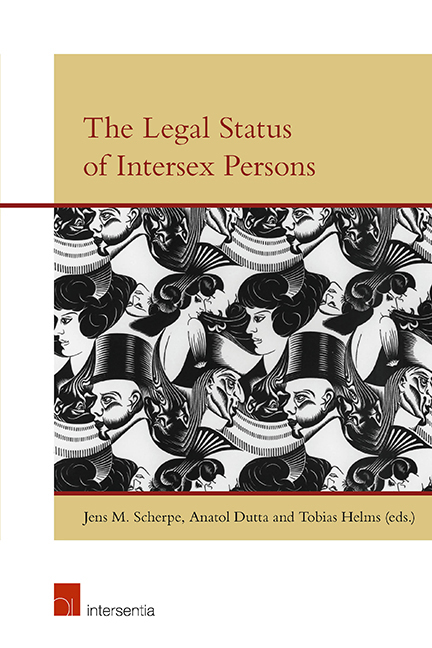Book contents
- Frontmatter
- Preface
- Contents
- List of Contributors
- The Legal Status of Intersex Persons: An Introduction
- Malta Declaration
- Darlington Statement
- Vienna Statement
- PART I MEDICINE AND PSYCHOLOGY
- PART II THEOLOGY AND LEGAL HISTORY
- PART III TRANSGENDER, TRANSSEXUALITY AND INTERSEX
- PART IV NATIONAL LEGAL DEVELOPMENTS
- Australia
- Sweden
- India
- The Netherlands
- France
- Colombia (The Colombian Constitutional Court)
- United States
- Malta
- Germany (The 2013 German Law)
- Germany (German Inter-Ministerial Working Group)
- Germany (Gender Diversity in Law)
- PART V PRIVATE INTERNATIONAL LAW ASPECTS OF INTERSEX
- PART VI INTERSEX AND HUMAN RIGHTS
Germany (Gender Diversity in Law)
from PART IV - NATIONAL LEGAL DEVELOPMENTS
Published online by Cambridge University Press: 31 January 2019
- Frontmatter
- Preface
- Contents
- List of Contributors
- The Legal Status of Intersex Persons: An Introduction
- Malta Declaration
- Darlington Statement
- Vienna Statement
- PART I MEDICINE AND PSYCHOLOGY
- PART II THEOLOGY AND LEGAL HISTORY
- PART III TRANSGENDER, TRANSSEXUALITY AND INTERSEX
- PART IV NATIONAL LEGAL DEVELOPMENTS
- Australia
- Sweden
- India
- The Netherlands
- France
- Colombia (The Colombian Constitutional Court)
- United States
- Malta
- Germany (The 2013 German Law)
- Germany (German Inter-Ministerial Working Group)
- Germany (Gender Diversity in Law)
- PART V PRIVATE INTERNATIONAL LAW ASPECTS OF INTERSEX
- PART VI INTERSEX AND HUMAN RIGHTS
Summary
The right to legal recognition of sex and gender identity is recognised as a fundamental and human right in Germany, as is protection against discrimination and violence based on gender identity and gender diversity in the context of the principle of non-discrimination. Against this background, the German Institute for Human Rights was commissioned by the Federal Ministry for Family Affairs, Senior Citizens, Women and Youth (BMFSFJ) to prepare a report on gender diversity in law, which was published in February 2017.
The report entitled ‘Gender Diversity in Law – Status Quo and Development of Regulatory Models for the Recognition and Protection of Gender Diversity’ examines how the legal recognition and protection of the diversity of physical sex development, gender identities and gender expression in Germany against the background of fundamental and human rights can and must be improved. the authors conclude that the current legal rules, in particular with regard to the situation of intersex persons and trans/transsexual persons, are inadequate. The report is an in-depth analysis of the current law, and uses a comparative as well as a socio-scientific assessment of the civil status regulation for the blank gender entry of intersex new-borns (§ 22 para. 3 Civil Status Act – Personenstandsgesetz – PStG). Several types of regulatory models for the recognition and protection of sex and gender identities have been developed (Part 1 and Annex of the report). Ultimately, the report recommends the drafting of a comprehensive legal framework on the recognition and protection of gender diversity (Part 2 of the report).
The development of regulatory alternatives was carried out in consultation with intersex and trans/transsexual persons, their parents, associations, counsellors and academics, and the initial draftof the Bill sent to an extended circle of independent organisations with a perspective on inter and trans/ transsexuality as well as by scientists and practitioners for comments.
SOCIAL-SCIENTIFIC ASSESSMENT OF § 22 PARA. 3 OF THE CIVIL STATUS ACT
The focus of the social-scientific assessment was the amendment of the Civil Status Act (PStG), which came into effect on 1 November 2013 and according to which children who ‘cannot be attributed to the female or the male gender’ (…) are to be entered without a gender specification in the register of births (§ 22 para. 3 PStG).
- Type
- Chapter
- Information
- The Legal Status of Intersex Persons , pp. 393 - 412Publisher: IntersentiaPrint publication year: 2018

